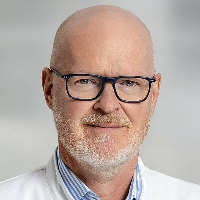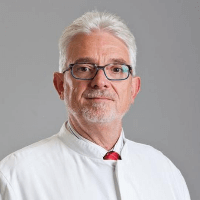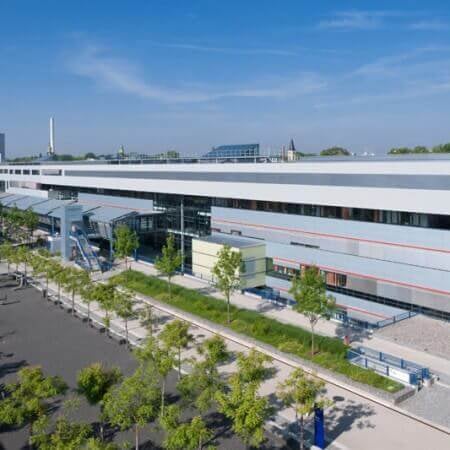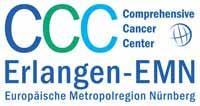Lutetium 177-PSMA (LU-177) for treatment of Neuroendocrine Tumors (NETs) in Germany
Treatment prices are regulated by national law of the corresponding countries, but can also include additional hospital coefficients. In order to receive the individual cost calculation, please send us the request and medical records.

Department of Nuclear Medicine
The Department of Nuclear Medicine offers the full range of diagnostic and therapeutic procedures using modern radioactive substances. The diagnostic options include scintigraphic studies of the lungs, heart, brain, kidneys, lymph nodes, bones, including in small patients. In the field of therapy, one of the priority focuses is the use of radioiodine therapy for thyroid pathologies. Medical care and patient care are provided by highly qualified doctors and nursing staff who believe that the health and wellbeing of their patients is a top priority.



Department of Nuclear Medicine
The Department of Nuclear Medicine offers the full range of modern diagnostics and therapy using various radioisotopes. The department is equipped with the advanced systems for carrying out such high-precision and informative examinations as SPECT, PET, etc. The department carries out more than 8,000 outpatient examinations annually. The key focus in the field of diagnostics is on the detection of neurological, cardiac and oncological diseases. The department's therapeutic options include the treatment of benign and malignant diseases of the thyroid gland, pain therapy in bone metastases, treatment of malignant tumors in children (for example, neuroblastomas). The spectrum is also complemented by such innovative techniques as radiosynoviorthesis, selective internal radiation therapy and radioimmunotherapy.






Department of Nuclear Medicine
The Department of Nuclear Medicine offers the full range of diagnostic and therapeutic services in the area of its specialization. Of particular interest are PET/CT, PET/MRI, SPECT/CT, as well as innovative therapeutic methods of nuclear medicine, such as peptide radioreceptor therapy for neuroendocrine tumors, liver tumor radioembolization, and treatment of prostate cancer using radioligands to prostate-specific membrane antigen (PSMA therapy). The department's doctors most often admit patients suffering from cancers, diseases of the nervous and cardiovascular system. The patients receive medical care from the highly qualified internationally renowned specialists with profound clinical training and rich experience. The department's doctors use only reliable radioisotopes, which do not have a harmful effect on the human body and do not cause any side effects. The patients are admitted both on an inpatient and outpatient basis.





Neuroendocrine tumors (NETs) are a rare group of tumors originating from cells of the diffuse neuroendocrine system.
Overview
Neuroendocrine tumors (NETs) are a rare type of neoplasms that affect neuroendocrine cells. This type of cells that produce biologically active substances is found in various tissues of the body, but most of them are located in the gastrointestinal tract and lungs. Neuroendocrine tumors (NETs) are slow-growing and cause severe hormonal disorders.
This type of neoplasms has a long asymptomatic period and is difficult to diagnose. This results in the fact that the majority of neuroendocrine tumors are detected at the advanced stages of the disease, already with multiple metastases. In recent decades, there has been a rapid increase in the number of patients diagnosed with neuroendocrine tumors followed by the process of metastases formation. However, to date, most doctors do not have sufficient experience in diagnosing and treating patients with this oncological pathology.
Symptoms and diagnostics
The peculiarity of neuroendocrine tumors (NETs) is that they secrete biologically active and that their amount can vary. Malignant NETs are formed from progenitor cells, which later differentiate into different neuroendocrine structures. With the advanced growth of the pathological formation, cells can produce different hormones. The tumor is classified according to the predominant cell type. The metastases in other tissues may differ in function from the "maternal" tumors. Therefore, the clinical symptoms of formations are very diverse.
If the tumor is located in the gastrointestinal tract or pancreas, patients usually experience:
- Degeneration of the gastric mucosa
- Increase in the concentration of hydrochloric acid
- Disturbances of food passing
- Intestinal disorders
- Formation of gallstones
- Changes in the peritoneum with the transformation of normal tissues into fibrous ones
When the respiratory tract is affected, patients usually experience:
- Respiratory disorders
- Low blood pressure
- Impairment of the work of the heart
Almost all patients with neuroendocrine tumors experience weight loss, skin rashes, circulatory disorders, have a tendency to blood clots formation, panic disorders, and anxiety attacks. At the site of the formation development, pain syndrome may be present. Due to the effect of biologically active substances, the body temperature rises, and patients may experience headaches.
There are several types of neuroendocrine tumors, that are usually detected at the advanced stages of the disease.
Carcinoids, as an advanced form of neuroendocrine tumors, most often manifest themselves by diarrhea (in 70% of patients), dysfunction of the heart valves (in 45% of patients), hormonal flushes, as in menopause (90% of patients). Carcinoids usually have metastases in the liver, lymph nodes, and lungs. At the same time, the sweating increases, the skin turns red; patients may experience sudden hot flashes. This complex of symptoms is called carcinoid syndrome.
An ulcer can sometimes be diagnosed as a result of gastrinoma metastases. Glucagonoma is characterized by symptoms of diabetes mellitus. With insulinoma, on the contrary, there is a strong decrease in blood sugar levels, which is manifested by weakness, loss of consciousness, trembling in the limbs. Tissues that are most commonly involved in glucagonoma metastases are the liver and regional lymph nodes.
Due to the wide variety of symptoms, clinical diagnosis making is difficult. Therefore, neuroendocrine tumors are usually detected at the advanced stages. Usually, when hormonal disorders appear, patients are tested for the level of hormones in the blood. After identifying the imbalance, further clinical examinations are carried out. Tomography and ultrasound scanning help to identify the localization of NETs and possible location of the metastases. A biopsy is performed to determine possible malignancy.
Lutetium PSMA Treatment
The goal of therapies for the treatment of neuroendocrine tumors is to selectively affect neuroendocrine tumor tissues, the cells of which are distinguished by the presence of a large number of specific superficial receptors. Therapies treating neuroendocrine tumors include treatments with the radioactive isotope Lutetium-177 PSMA.
In therapies with Lutetium-177 PSMA (Lu-177), an antiproliferative effect is achieved with the tumor itself and its metastases. Also, the use of Lutetium-177 PSMA therapies helps prevent carcinoid crises in both highly differentiated and poorly differentiated neuroendocrine tumors.
The treatment involves the injection of a radioactive substance that contains Lutetium-177 PSMA (Lu-177). The Lutetium-177 PSMA (Lu-177) is injected intravenously. By binding to the superficial cell receptors, the radioactive substance Lu-177 is delivered directly to the tumor. The goal of treatment is to destroy tumors and relieve symptoms of the disease. The results of therapy and its effectiveness vary from patient to patient.
To ensure that the patient is eligible for Lutetium-177 PSMA therapy, the patient needs to undergo a series of imaging tests. Also, it is necessary to assess kidney function.
In most cases, the Lutetium-177 PSMA therapy technique is used for treating primary neuroendocrine tumors and advanced NETs with metastases. Lutetium-177 PSMA therapy can be used both independently (palliative treatment) and in combination with other modern methods, such as surgical treatment, arterial embolization, etc. The method is well tolerated by patients and does not have severe side effects (vomiting, nausea, pain, alopecia, weakness, etc.).
The essence of the therapy is the use of a carrier molecule, which carries the radioactive isotope Lutetium-177 PSMA (LU-177). It is administered to a patient intravenously. The molecule and the radioactive isotope bind to receptors on the surface of the tumor neuroendocrine cells, thereby performing local radiation therapy. Due to this, the destruction of tumor tissues and metastases occurs with a minimal impact on the cells of other organs that do not have (or contain a small amount) of such receptors. In particular, Lutetium-177 PSMA has virtually no toxic effect on bone marrow and kidney tissue. Thanks to the use of therapy, the process of diagnosing the tumor and its metastases becomes easier as well. The PSMA PET scan is carried out after the introduction of a radioactive complex, making it possible to detect the remaining foci of neuroendocrine tumors.
Lutetium-177 PSMA is injected intravenously during a half an hour; amino acids are given alongside for eight hours. On the eve of the session, patients must be admitted to the oncology department. At the end of the hospitalization, a blood test will be performed. Several other tests might also be needed.
It is important to follow all the instructions of the medical staff during hospitalization. This is the key to the effectiveness and safety of the treatment.
The drug is administered up to four times, with one or two months intervals. After that, the patient can return to his usual life. At the end of the full course of treatment, the specialists of the hospitals conduct a control examination of patients, which makes it possible to evaluate the effectiveness of therapy.
The substance is excreted gradually, mainly with the urine. Also, as the level of radiation decreases naturally over time, there is less and less radioactive material in the body every day. The final elimination time varies from person to person.
In terms of side effects, weakness is natural after therapy. It can be felt during the first days after the therapeutic session. Also, some patients feel nausea during the session. It is important to inform the medical staff of any change in the health state. As a result of therapy, a decrease in some blood parameters (hemoglobin, white blood cells and platelets count), as well as general weakness, is possible. At the time of discharge from the hospitals, the level of radiation emitted by patients should be below the threshold value according to international standards. Nevertheless, in the first days after leaving the hospital, some level of radioactivity in the body remains. It is the responsibility of patients to follow the instructions given by the doctor at discharge.
Where can I undergo Lutetium-177 PSMA treatment in Germany?
Health tourism is becoming more and more popular these days, as a level of medicine in Germany often ensures a much better quality of Lutetium-177 PSMA treatment.
The following hospitals show the best success rates in Lutetium-177 PSMA treatment:
- Helios Hospital Berlin-Buch
- University Hospital Frankfurt am Main
- University Hospital Carl Gustav Carus Dresden
- University Hospital Erlangen
- University Hospital Bonn
You can find more information about the hospitals on the Booking Health website.
The cost of treatment in Germany
The prices in hospitals on the Booking Health website are relatively low. With Booking Health, you can undergo Lutetium-177 PSMA treatment in Germany at an affordable price.
The cost of treatment varies, as the prices depend on the hospitals, the specifics of the disease, and the complexity of its treatment.
The cost of treatment of neuroendocrine tumors Lutetium-177 PSMA is 13,310-20,790 EUR.
You might want to consider the cost of possible additional procedures and follow-up care. Therefore, the ultimate cost of treatment in Germany may differ from the initial price.
To make sure that the overall cost of treatment in Germany is suitable for you, contact us by leaving the request on the Booking Health website.
How can I undergo Lutetium-177 PSMA treatment in Germany?
It is not easy to self-organize any treatment abroad. It requires certain knowledge and expertise. Thus, it is safer, easier, and less stressful to use the services of a medical tourism agency.
As the largest and most transparent medical tourism agency in the world, Booking Health has up-to-date information about the Lutetium-177 PSMA treatment in the best hospitals in Germany. We will help you select the right clinic taking into account your wishes for treatment.
We want to help you and take on all the troubles. You can be free of unnecessary stress, while Booking Health takes care of all organizational issues regarding the treatment. Our services are aimed at undergoing t Lutetium-177 PSMA treatment safely and successfully.
Medical tourism can be easy! All you need to do is to leave a request on the Booking Health website, and our manager will contact you shortly.

